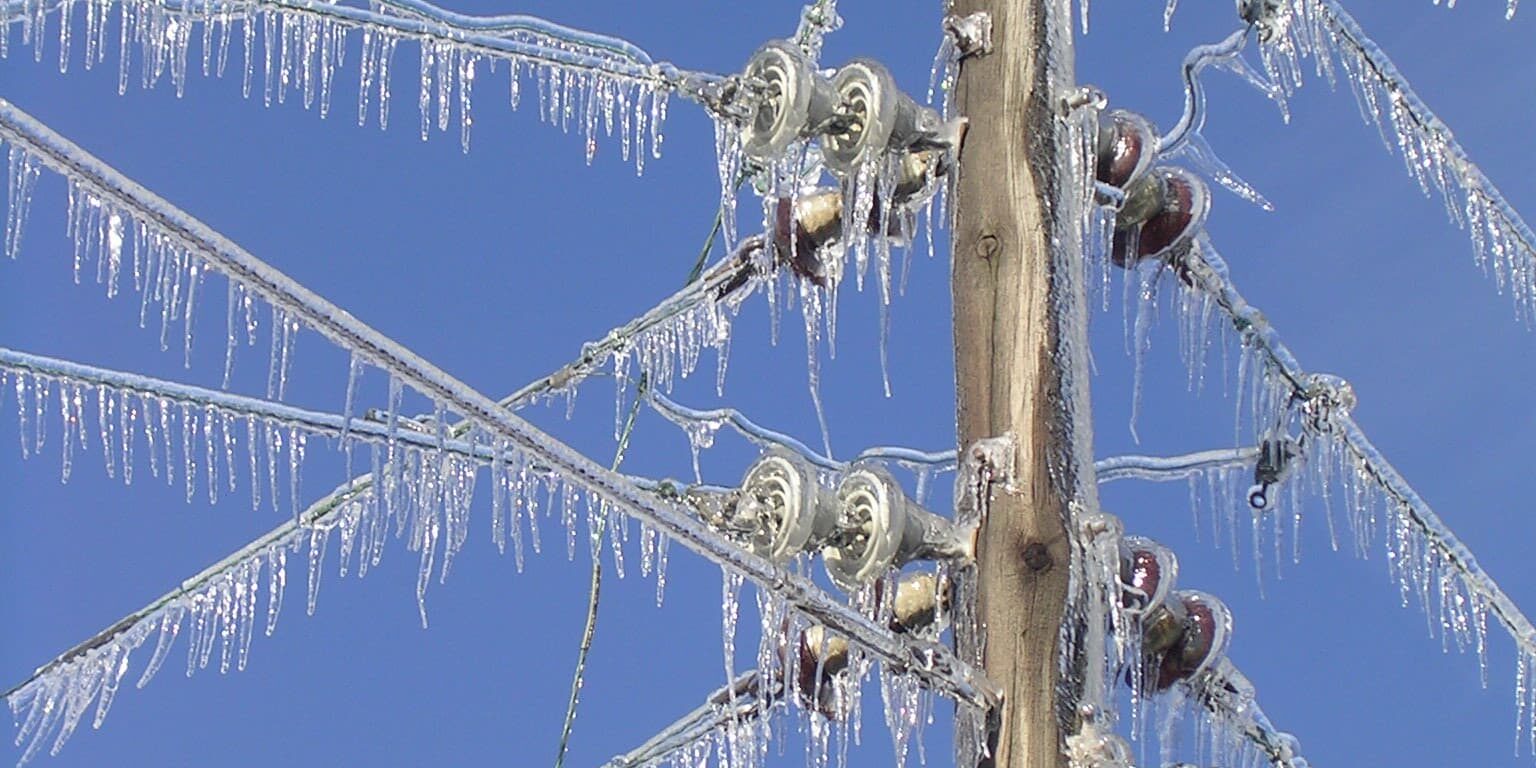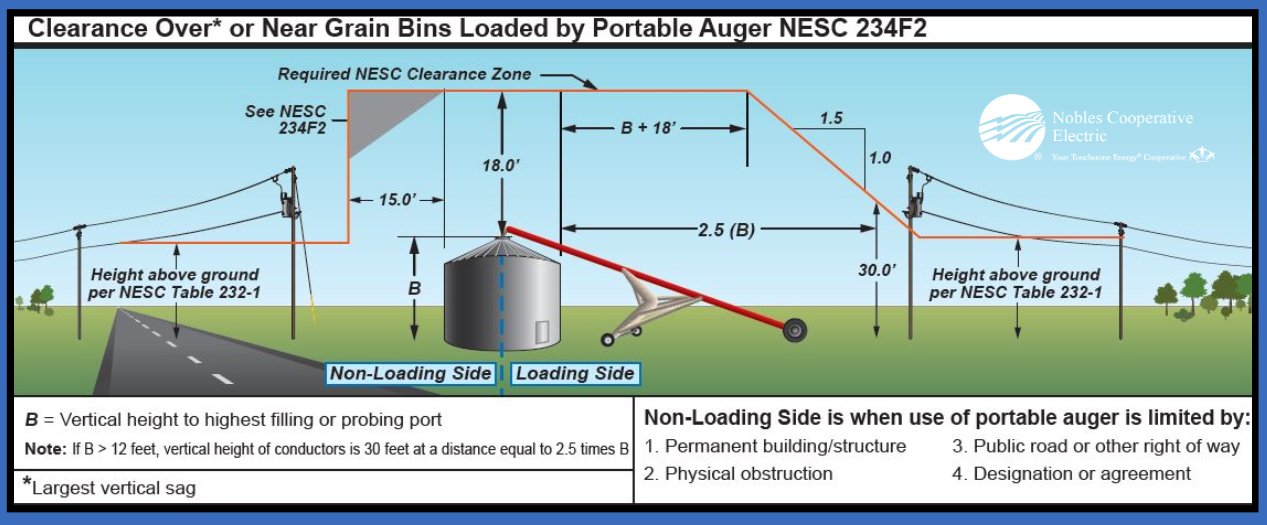
As members of your electric cooperative We want you to STAY SAFE!
We're all about keeping you informed on electrical safety and making sure our team stays safe too. Looking for an electrical safety demonstration at your school or event? Don't hesitate to contact our team.
Outdoor Safety Tips
- Never touch a power line! Report downed power lines immediately
- Don’t put signs or advertisements on power poles – they are a hazard and reduce the life of the pole
- Be careful not to touch overhead power lines with ladders, TV antennas or other equipment
- Never retrieve balls or other objects from substations – high-voltage equipment is very dangerous
Indoor Safety Tips
- Always replace damaged cords
- Never use electrical appliances in wet areas
- Pull on the plug, not the cord, to unplug an appliance
- Don’t overload outlets with too many appliances
- Unplug extension cords if not in use
- Use the correct wattage for light bulbs. Higher than recommended wattages can overheat and lead to fire

Tree Maintenance
Nobles Cooperative Electric is committed to providing safe, reliable energy, which necessitates pruning trees near power lines.
Our vegetation management program is not random, but by design, and strives to be proactive. This program is based on industry best practices designed to prevent dangerous situations and ensure electric reliability.
Our vegetation management program recognizes trees may be the cause of some power outages but are also a very important part of the natural beauty of our valley.
We strive to work collaboratively with you to address any concerns before tree work begins.
Electrical Safety Tips During And After A Storm
Lightning
When thunderstorms are rolling your way, stay safe with these helpful tips:
- Listen to local news or NOAA Weather Radio for emergency updates. Watch for signs of a storm, like darkening skies, lightning flashes or increasing wind.
- Postpone outdoor activities if thunderstorms are likely to occur. Many people struck by lightning are not in the area where rain is occurring.
- If a severe thunderstorm warning is issued, take shelter in a substantial building or in a vehicle with the windows closed. Get out of mobile homes that can blow over in high winds.
- If you can hear thunder, you are close enough to be in danger from lightning. If thunder roars, go indoors! The National Weather Service recommends staying inside for at least 30 minutes after the last thunder clap.
- Avoid electrical equipment and telephones. Use battery-powered TVs and radios instead.
- Close windows and outside doors securely. Keep away from windows.
- Do not take a bath, shower or use plumbing.
- If you are driving, try to safely exit the roadway and park. Stay in the vehicle and turn on the emergency flashers until the heavy rain ends. Avoid touching metal or other surfaces that conduct electricity in and outside the vehicle.
- If you are outside and cannot reach a safe building, avoid high ground, water, tall, isolated trees and metal objects such as fences or bleachers. Picnic shelters, dugouts and sheds are NOT safe.

What Happens In A Flood?
Down Power Line Safety
What To Do During an Outage
After you’ve verified that your outage has been reported, please keep phone lines open for all members affected by the outage. We know that being without power is inconvenient and frustrating, and we assure you that one call is all you need to make.
During a Power Outage
- Keep freezers and refrigerators closed.
- Only use generators outdoors and away from windows.
- Do not use a gas stove to heat your home.
- Disconnect major appliances and electronics to avoid damage from electrical surges.
- Have alternate plans for refrigerating medicines or using power-dependent medical devices.
- Check on neighbors.
For more tips, visit the Department of Homeland Security or the American Red Cross website.


Clearance Levels and Farm Safety
The National Electric Safety Code sets minimum clearance distances between power lines and obstructions or the ground. In addition, the federal government has strict reliability standards for electrical lines. Obstructions in the right of way can be too close to our lines, causing reliability problems and safety issues.
Electric lines are the backbone of the regional electric grid. They are vital to our economic health and our nation’s security. Keeping the areas beneath them clear is critical for your safety and the safety of our employees. And it’s an important part of maintaining the reliability of electric service for you and your neighbors.
Take a moment to review the clearance levels in the Application Guide and contact us should you have any questions.
Farmers looking to install a new grain bin can streamline their planning process by involving Nobles Cooperative Electric. The cooperative offers support to ensure a safe environment for those who work and reside near grain bins.

Call Before You Dig
Before you start landscaping, digging or excavating more than 12-inches deep, remember you must have your underground lines located. It is the law! Call Gopher State One Call at 800-252-1166, 811 or visit their website at GopherStateOneCall.org to have your lines clearly marked so you can work safely on your project. Make your call 48 hours before digging.
Digging may seem like no big deal, but regardless of where you live or conduct your business, the gas, electric, cable, water and sewer lines that serve you, may very likely be underground. It doesn’t matter how deep you plan to dig, be safe and call because hidden dangers could be just beneath the surface.
The MN State Statute 216D One Call Law Updated, Changes Effective Aug. 1, 2024
Safety Blog

Putting Safety First – At Work, At Home, Always
Safety Training Recap Safety is also important at home-please remember to take a moment to review your own emergency plans, have a strategy in place, and stay prepared to protect your loved ones A few weeks ago, Nobles Cooperative Electric held its fourth of nine scheduled safety training events for 2025-part of our ongoing, year-round […]

May is Electrical Safety Month
May is Safety Month Electrical Safety Month Our farming community, members, construction crews, and DIY enthusiasts are all extremely valuable to our Nobles Cooperative Electric family, and we want to share a few reminders for your spring projects. Whether you’re working in your farm fields or your own backyard, please remember these safety tips: Stay […]

Space Heaters: Don’t get Burned
Space Heaters: Don’t get Burned Space Heater Safety: Stay Warm and Safe This Winter According to the National Fire Prevention Association, nearly half of the heating equipment fires (46%) occur in the three-month period from December through February. While they can be a great way to stay cozy, it’s crucial to use them responsibly. Here […]

Winter Chills
Old Man Winter can bring some serious chills! Here’s how to stay safe and warm, indoors and out: Beat the Freeze Outdoors Layer Up: Wear loose-fitting, lightweight layers to trap warm air. Head to Toe: Don’t forget a hat and mittens (they’re warmer than gloves!) Stay Dry: Wet clothes can make you colder. Block the […]

Holiday Hazards – Pets
Holiday Hazards: Keep Your Pets Safe All Year Round The holidays bring extra dangers for our furry friends. Festive decorations, tempting treats, and new electronics can all pose risks to curious pets. While the holidays might heighten the dangers, it’s important to be vigilant year-round. Here’s how to keep your pets safe: Electrical Hazards: Cords […]

Winter Safety Tips
Stay Safe This Winter: 5 Home Safety Tips Winter’s chilly embrace brings with it a desire for warmth and comfort within our homes. But as we turn up the heat, light festive candles and rely more on electrical appliances, the risk of home fires increases. Take these five simple steps to safeguard your home and […]

Look UP!
LOOK UP Before You Climb! As the season arrives for gutter cleaning and winter preparations, it’s crucial to be mindful of your environment to avoid any hazards! Using a ladder near overhead power lines can lead to electrocution. Keep these safety tips in mind when using a ladder. Have you ever thought about the dangers […]

Farm Safety
National Farm Safety and Health Week National Farm Safety and Health Week is an annual event dedicated to promoting the well-being and safety of farmers, ranchers, and agricultural workers. Celebrated during the third week of September, its origins trace back to 1944 when President Franklin D. Roosevelt proclaimed the need for such an observance. The […]

Collisions with Electrical Equipment Safety Tips
Every year, tens of thousands of accidents nationwide involve vehicles striking utility poles. In case of such an unfortunate event, remember the following life-saving tips. After a collision with electric equipment, the safest place for passengers is inside the vehicle. Getting out could lead to electrocution. Stay in the vehicle until help arrives and power lines […]

Generic Chargers Can Cause Serious Injury
Don’t cut corners when buying and using phone chargers People are always losing their phone chargers. As a solution, many people reach for the low-cost, generic plug-in USB chargers and charging cables found in the sea of impulse items that flank check-out lines. It can save money and it’s so convenient, most people rationalize when […]

Electrical Hazards During & After a Storm
A storm is always ready, are you? It is important to prepare in advance for a severe storm or natural disaster. Gathering emergency kit items, having a communication plan in place and knowing when, how and where to take shelter saves lives. It is easy to be complacent about storms or think that they won’t […]

Controlled Burns
Controlled burns, when managed properly, offer numerous advantages for agricultural land. However, if not handled safely, they can result in property damage, power outages, injuries, and even fatalities. Safe Electricity emphasizes the importance of prioritizing safety and provides guidance on precautions to take near power lines: Before conducting a controlled burn, acquaint yourself with the […]
Have questions?
Your Cooperative team is here to assist with your membership and service questions.
